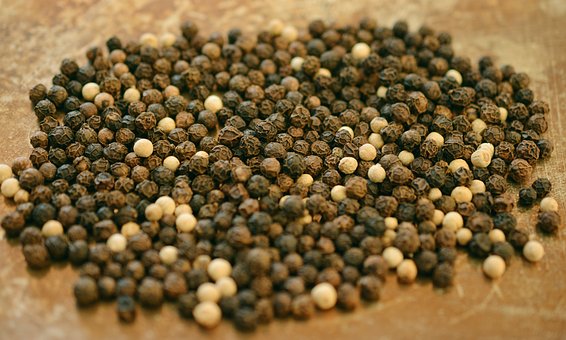Black Pepper Is More Than Just a Condiment
© HealthyMuslim. See Terms and Conditions

Black pepper comes from the berries of the pepper plant. black pepper, green pepper and white peppercorns are actually the same fruit (Piper nigrum); the difference in their color is a reflection of varying stages of development and processing methods.
Black pepper is an excellent source of manganese, a very good source of iron and vitamin K, and a good source of dietary fiber.
Health Benefits
A Powerful Antioxidant
Researchers from India examined the antioxidant activity and phenolic content of plant foods commonly consumed in India, such as cereals, legumes, oil seeds, oils, green leafy vegetables, other vegetables, and spices. They found that of all the foods tested, black pepper had the highest level of antioxidant activity and also the highest phenolic content.
Digestion and Intestinal health
Many digestive difficulties are the result of a lack of hydrochloric acid, which is needed for digesting proteins and other food components. Black pepper stimulates the taste buds and alerts the stomach to increase hydrochloric acid secretion, improving digestion. Without adequate amounts, undigested food can sit in the stomach for prolonged periods, leading to heartburn and indigestion. Undigested food may also pass into the intestines where it can become a food source for unfriendly bacteria, producing gas, irritation, diarrhea or constipation.
Black pepper's action promotes complete digestion. It acts as a diuretic, reducing bloating in the intestinal tract, and as a carmitive, preventing the formation of intestinal gas. Peppery foods also increase the production of urine, in which toxins filtered by the kidneys are removed from the body. Furthermore, pepper's warming effects increase sweating, another route for elimination.
Anti-Inflammatory and Anti-Arthritic
Piperine, the active phenolic compound in black pepper extract, was found to significantly reduce the perception of pain and arthritis symptoms in rats. Detailed examination showed that piperine significantly reduced the inflammation in their joints.
Colon cancer
A study to determine if black pepper, resveratrol from grapes, and cinnamaldehyde from cinnamon have anti-prolific effects on colon cancer, found that black pepper had significant anti-proliferative activity on colon cancer cells.
Increases Absorption and Bioavailability of Nutrients
A study found that the active compound in black pepper, piperine, increased the bioavailability and absorption of curcumin by a huge 2000%, both in humans and rats. Curcumin is a compound from the herb turmeric, known for fighting cancer, pain, inflammation and infections.
Tips on Using Black Pepper
- Black pepper is available whole, crushed or ground into a powder. To ensure maximum flavor and nutrients, buy whole peppercorns and grind them in a mill just before they are needed.
- Black pepper should not be added to food while it is cooking, as it loses its flavor, aroma and Vitamin C when heated or cooked for too long. Adding it near the end will help to preserve its flavor.
- Freshly crushed black pepper, salt, olive oil, and lemon juice pepper make a delicious salad dressing.
References
- Saxena R, Venkaiah K, Anitha P et al. Antioxidant activity of commonly consumed plant foods of India: contribution of their phenolic content. International Journal of Food Sciences and nutrition, 1465-3478, Vol 58: 4, 2007, P. 250 - 260
- Bang, JS, et al. Anti-inflammatory and antiarthritic effects of piperine in human interleukin 1B-stimulated fibroblast-like synoviocytes and in rat arthritis models arthritis Research & Therapy 2009, 11:R49
- Shoba G, et al. Influence of Piperine on the Pharmacokinetics of curcumin in Animals and Human Volunteers. Planta Med 1998; 64: 353-356.
Link to this article: Show: HTML Link • Full Link • Short Link
Share or Bookmark this page: You will need to have an account with the selected service in order to post links or bookmark this page.





|
Related Articles:
- Spices As Powerful Healers: More Potent Than Aspirin in Reducing Blood Clots
- Black Pepper Is More Than Just a Condiment
You must be registered and logged in to comment.
Most Popular
Latest Articles
Popular Subjects
Health, fitness and longevity
Based upon the principles of health
in the Qur'an and Prophetic Traditions.
HealthyMuslim.Com
There are two bounties in which
most people lose out: good health
and free time. Al-Bukhari.























